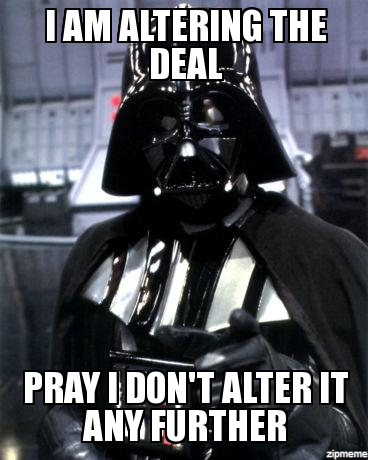When Obama was in office, he entered the United States into a nuclear nonproliferation deal with Iran. Yesterday Trump pulled the United States out of that deal:
With a stroke of his pen US President Donald Trump has jeopardised the one agreement – good or bad – that seeks to constrain Iran’s nuclear ambitions.
He launched a scathing assault on the deal and its deficiencies.
But he offered no alternative policy to put in its place. He has put US diplomacy on a collision course with some of Washington’s closest allies.
Trump’s detractors are claiming that this will ensure that Iran acquires nuclear weapons while his supporters are claiming that the deal was a terrible deal. I’m not going to argue the pros or cons of the previous deal. However, I do want to take a moment to discuss a facet of this issue that isn’t getting much attention.
It is notoriously difficult for foreign governments to deal with the United States. Every time the party in power switches hands between the Democrats and Republicans the rules seem to change. When the Democrats were in power, Iran was able to make a nonproliferation deal with the United States. Now that the Republicans are in power, it cannot. In the span of less than a decade the rules between Iran and the United States changed… again.
Imagine if business deals were as volatile as deals between foreign governments and the United States. Would anybody continue doing business with, say, Microsoft if every time a company made a deal to license the company’s operating system for five years it decided to cancel the deal after two years? No, because nobody can realistically do business in an entirely unpredictable environment. Contracts exist to ensure that there are consequences for violating a deal. Unfortunately, most foreign governments can’t punish the United States for breaking a deal because they lack the military might to do so.
It’s easy to blame Obama for making a bad deal or Trump for pulling the United States out of an existing deal. What seems to be more difficult for people to grasp is that the United States has developed a reputation for being unreliable and that reputation is going to hinder its ability to make any kind of deal with a foreign government.

Iran made a deal with Obama.
This was an Executive agreement. It was not supported by Congress, and had little support by the People.
Obama wasn’t made king, and his word wasn’t law. The deal was between his administration and Iran’s. Any commitment to that deal effectively ended with his Presidency.
Regardless of what specific administration the deal was made with, the fact that deals made with the United States are subject to change every time the administration changes makes the United States look like an unscrupulous partner. That kind of reputation will push countries to make deals with other powers such as China instead.